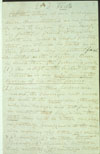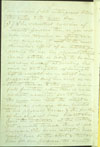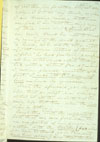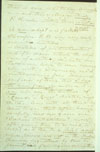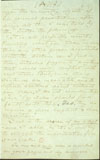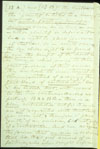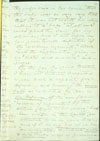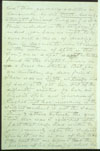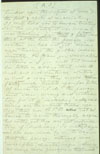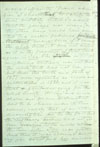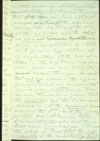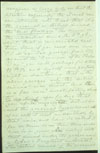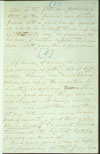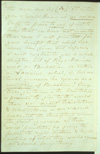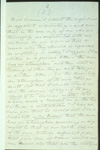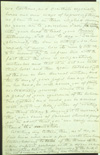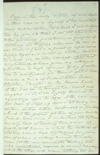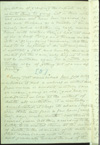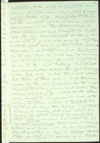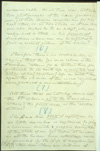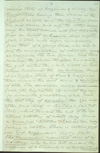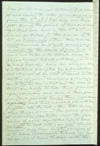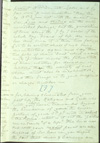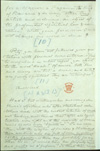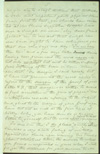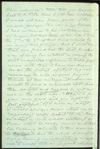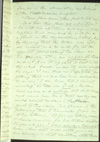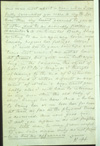Mahatma Letter No. 85b
| Quick Facts | |
|---|---|
| People involved | |
| Written by: | Koot Hoomi |
| Received by: | A. P. Sinnett |
| Sent via: | unknown |
| Dates | |
| Written on: | unknown |
| Received on: | mid-September 1882 |
| Other dates: | unknown |
| Places | |
| Sent from: | "quite near to Darjeeling" |
| Received at: | Simla, India |
| Via: | unknown |
This is Letter No. 85b in The Mahatma Letters to A. P. Sinnett, 4th chronological edition. It corresponds to Letter No. 24b in Barker numbering. See below for Context and background.
< Prev letter chrono
Next letter chrono >
< Prev letter Barker
Next letter Barker >
Page 1 transcription, image, and notes
|
[A] At this stage of our correspondence, misunderstood as we generally seem to be, even by yourself, my faithful friend, it may be worth our while and useful for both, that you should be posted on certain facts — and very important facts — connected with adept-ship. Bear in mind then, the following points. [1] An adept — the highest as the lowest — is one only during the exercise of his occult powers. [2] Whenever these powers are needed, the sovereign will unlocks the door to the inner man [the adept] who can emerge and act freely but on condition that his jailor — the outer man will be either completely or partially paralyzed — as the case may require; viz: either (a) mentally and physically; (b) mentally, — but not physically; (c) physically but not entirely mentally; (d) neither, — but with |
NOTES:
|
Page 2
|
an akasic film interposed between the outer and the inner man. [3] The smallest exercise of occult powers then, as you will now see, requires an effort. We may compare it to the inner muscular effort of an athlete preparing to use his physical strength. As no athlete is likely to be always amusing himself at swelling his veins in anticipation of having to lift a weight, so no adept can be supposed to keep his will in constant tension and the inner man in full function, when there is no immediate necessity for it. When the inner man rests the adept becomes an ordinary man, limited to his physical senses and the functions of his physical brain. Habit sharpens the intuitions of the latter, yet is unable to make them supersensuous. The inner adept is ever ready, ever on the alert, and that suffices for our purposes. At moments |
NOTES: |
Page 3
|
of rest then, his faculties are at rest also. When I sit at my meals, or when I am dressing, reading or otherwise occupied I am not thinking even of those near me; and, Djual Khool can easily break his nose to blood, by running in the dark against a beam, as he did the other night — (just because instead of throwing a "film" he had foolishly paralyzed all his outer senses while talking to and with a distant friend) — and I remained placidly ignorant of the fact. I was not thinking of him — hence my ignorance. From the aforesaid, you may well infer, that an adept is an ordinary mortal, at all the moments of his daily life but those — when the inner man is acting. Couple this with the unpleasant fact that we are forbidden to use one particle of our powers in connexion with the Eclectics [for which you have to thank your President and him alone] and that the little |
NOTES: |
Page 4
|
that is done, is, so to say, smuggled in — and then syllogize thusly — K.H. when writing to us is not an adept. A non-adept — is fallible. Therefore, K.H. may very easily commit mistakes; — Mistakes of punctuation — that will often change entirely the whole sense of a sentence; idiomatic mistakes — very likely to occur especially when writing as hurriedly as I do; mistakes arising from occasional confusion of terms that I had to learn from you — since it is you who are the author of "rounds" — "rings" — "earthly rings" — etc. etc. Now with all this, I beg leave to say, that after having carefully read over and over our "Famous Contradictions" myself; after giving them to be read to M.; and then to a high adept whose powers are not in the Chohan's chancery sequestered by Him to prevent him from squandering them |
|
NOTES:
|
Page 5
|
upon the unworthy objects of his personal predilections; after doing all this I was told by the latter the following: "It is all perfectly correct. Knowing what you mean, no more than any other person acquainted with the doctrine, can I find in these detached fragments anything that would really conflict with each other. But, since many sentences are incomplete, and the subjects scattered about without any order, I do not wonder that your "lay chelas" should find fault with them. Yes; they do require a more explicit and clear exposition." Such is the decree of an adept — and I abide by it; I will try to complete the information for your sake. In one and only case — marked on your pages and my answers |
NOTES:
|
Page 6
|
[12A], and [12B] the last — is the "plaintiff" entitled to a hearing, but not to a farthing even — for damages; since, as in law, no one — either plaintiff or defendant — has a right to plead ignorance of that law, so in Occult Sciences, the lay chelas ought to be forced to give the benefit of the doubt to their gurus in cases, in which, owing to their great ignorance of that science they are likely to misinterpret the meaning — instead of accusing them point blank of contradiction! Now I beg to state, that, with regard to the two sentences — marked respectively 12A and 12B — there is a plain contradiction but for those who are not acquainted with that tenet; you were not, and therefore I plead "guilty" of an omission, but "not guilty" of a contradiction. And even as regards the former, that omission is so small that, like the girl accused of infanticide, who when brought before |
NOTES: |
Page 7
|
the Judge said in her excuse that the baby was so very very little that it was not worth his while calling it a "baby" at all — I could plead the same for my omission, had I not before my eyes your terrible definition of my "exercising ingenuity." Well, read the explanation given in my "Notes and Answers" and judge. By the bye, my good Brother, I have not hitherto suspected in you such a capacity for defending and excusing the inexcusable as exhibited by you in my defense, of the now famous "exercise of ingenuity." If the article [reply to C. C. Massey] has been written in the spirit you attribute to me in your letter; and if I, or any one of us has "an inclination to tolerate subtler and more tricksy ways of pursuing an |
NOTES: |
Page 8
|
end" than generally admitted as honourable by the truth-loving, straight-forward European (is Mr. Hume included in this category?) — indeed you have no right to excuse such a mode of dealing, even in me; nor to view it "merely in the nature of spots in the sun," since a spot is a spot whether found in the bright luminary or upon a brass candlestick. But you are mistaken, my dear friend. There was no subtle, no tricky mode of dealing, to get her out of the difficulty created by her ambiguous style and ignorance of English, not her ignorance of the subject — which is not the same thing and alters entirely the question. Nor was I ignorant of the fact that M. had written to you previously upon the subject since it was in one of his letters [the last but one before I took the business off his hands] in which he |
|
NOTES: |
Page 9
|
touched upon the subject of "races" for the first and spoke of reincarnations. If M. told you to beware trusting Isis too implicitly, it was because he was teaching you truth and fact — and that at the time the passage was written we had not yet decided upon teaching the public indiscriminately. He gave you several such instances — if you will but re-read his letter — adding that were such and such sentences written in such a way they would explain facts now merely hinted upon, far better. Of course to "C.C.M." the passage must seem wrong and contradictory for it is "misleading" as M. said. Many are the subjects treated upon in Isis that even H.P.B. was not allowed to become thoroughly acquainted with; yet they are not contradictory if — "misleading." To make her say — as she was made by me to say — that the passage criticized was "incomplete, chaotic, vague . . . clumsy as many more passages in that work" |
NOTES:
|
Page 10
|
was a sufficiently "frank admission" I should think, to satisfy the most crotchety critic. To admit "that the passage was wrong," on the other hand, would have amounted to a useless falsehood, for I maintain that it is not wrong; since if it conceals the whole truth, it does not distort it in the fragments of that truth as given in Isis. The point in C.C.M.'s complaining criticism was not that the whole truth had not been given, but that the truth and facts of 1877 were represented as errors and contradicted in 1882 and it was that point — damaging for the whole Society, its "lay" and inner chelas, and for our doctrine — that had to be shown under its true colours; namely that of an entire misconception due to the fact that the "septenary" doctrine had not yet been divulged to the world at the time when Isis was written. And thus it was shown. I am sorry you do not find her answer |
NOTES: |
Page 11
|
written under my direct inspiration "very satisfactory," for it proves to me only that up to this you have not yet grasped very firmly the difference between the sixth and seventh and the fifth, or the immortal and the astral or personal "Monads — Egos." The suspicion is corroborated by what H — X gives in his criticism of my explanation at the end of his "letter" in the September number; your letter before me completing the evidence thereupon. No doubt the "real Ego inheres in the higher principles which are reincarnated" periodically every one, two, or three or more thousands of years. But the immortal Ego the "Individual Monad", is not the personal monad which is the 5th; and the passage in Isis did not answer Eastern reincarnationists — who maintain in that same Isis — had you but read the whole of it — that the individuality or the immortal "Ego" has to |
NOTES:
|
Page 12
|
re-appear in every cycle — but the Western especially the French reincarnationists, who teach that it is the personal, or astral monad, the "moi fluidique" the manas, or the intellectual mind, the 5th principle in short, that is reincarnated each time. Thus, if you read once more C.C.M.'s quoted passage from Isis against the "Reviewer of the Perfect Way," you will perhaps find that H.P.B. and myself were perfectly right in maintaining that in the above passage only the "astral monad" was meant. And, there is a far more "unsatisfactory shock" to my mind, upon finding that you refuse to recognise in the astral monad the personal Ego — whereas, all of us call it most undoubtedly by that name, and have so called it for millenniums — than there could ever be in yours when meeting with that monad under its proper name in E. Levi's Fragment on Death! The "astral monad" is the "personal |
NOTES:
|
Page 13 right side
|
Ego," and therefore, it never reincarnates, as the French Spirites, will have it, but under "exceptional circumstances;" in which case, reincarnating, it does not become a shell but, if successful in its second reincarnation will become one, and then gradually lose its personality, after being so to say emptied of its best and highest spiritual attributes by the immortal monad or the "Spiritual Ego, during the last and supreme struggle. The "jar of feeling" then ought to be on my side, as indeed it only "seemed to be another illustration of the difference between eastern and western methods," but was not — not in this case at any rate. I can readily understand, my dear friend, that in the chilly condition you find yourself (mentally) in, you are prepared to bask even in the rays of a funereal pile upon which a living sutti is being performed; but why, why call it a — Sun, and excuse its spot — the corpse? |
NOTES: |
Page 14
|
The letter addressed to me, which your delicacy would not permit you to read, was for your perusal & sent for that purpose. I wanted you to read it. Your suggestion concerning G.K.'s next trial in art — is clever, but not sufficiently, as to conceal the white threads of the Jesuitically black insinuation. G.K. was however caught at it. "Nous verrons, nous verrons!" says the French song. G. Khool says — presenting his most humble salaams — that you have "incorrectly described the course of events as regards the first portrait." What he says is this: (1) "the day she came" she did not ask you "to give her a piece of" etc. (page 300) but after you had begun speaking to her of my portrait, which she doubted much whether you could have. It is but after half-an-hour's talk over it in the front drawing room — you two forming the two upper points of the triangle, near your office door, and your lady the lower one (he was there he says) that she told you she would try. It was then that she asked you for "a piece of thick white paper" and that you gave her a piece of a thin letter paper, which had been touched by some very anti-magnetic person. However he did, he says, the best he could. On the day following, as Mrs. S. had looked at it just twenty seven minutes before he did it, he accomplished his task. It was not "an hour or two before" as you say for he had told the "O.L." to let her see it just before breakfast. After breakfast, she asked you for a piece of Bristol board, and you gave her two pieces, both marked and not one as you say. The first time she brought it out |
NOTES:
|
Page 13 left side
|
it was a failure, he says, "with the eyebrow like a leech," and it was finished only during the evening, while you were at the Club, at a dinner at which the old Upasika would not go. And it was he again G.K. "great artist" who had to make away with the "leech," and to correct cap and features, and who made it "look like Master" (he will insist giving me that name though he is no longer my chela in reality), since M. after spoiling it would not go to the trouble of correcting it but preferred going to sleep instead. And finally, he tells me, my making fun of the portrait notwithstanding, the likeness is good but would have been better had M. sahib not interfered with it, and he, G.K. allowed to have his own "artistic" ways. Such is his tale, and he therefore, is not satisfied with your description and so he said to Upasika who told you something quite different. Now to my notes.
|
NOTES:
|
Page 15
|
Nor do they fret me — particularly. But as they furnish our mutual friend with a good handle against us, which he is likely to use any day in that nasty way, so pre-eminently his own, I rather explain them once more — with your kind permission. Of course, of course; it is our usual way of getting out of difficulties. Having been "invented" ourselves, we repay the inventors by inventing imaginary races. There are a good many things more we are charged with having invented. Well, well, well; there's one thing, at any rate, we can never be accused of inventing; and that is Mr. Hume himself. To invent his like transcends the highest Siddhi powers we know of. And now good friend, before we proceed any further, pray read |
|
NOTES: |
Page 16
|
appended No. [A]. It is time you should know us as we are. Only, to prove to you, if not to him, that we have not invented those races, I will give out for your benefit that which has never been given out before. I will explain to you a whole chapter out of Rhys Davids work on Buddhism, or rather on Lamaism, which, in his natural ignorance he regards as a corruption of Buddhism! Since those gentlemen — the Orientalists — presume to give to the world their soi-disant translations & commentaries on our sacred books, let the theosophists show the great ignorance of those "world" pundits, by giving the public the right doctrines & explanations of what they would regard as an absurd, fancy theory. |
|
NOTES:
|
Page 17
|
And because I admit the superficial or apparent inconsistency — and even that in the case only of one who is so thoroughly unacquainted with our doctrines as you are — is that a reason why they should be regarded as conflicting in reality? Suppose I had written in a previous letter — "the moon has no atmosphere" and then went on talking of other things; and told you in another letter "for the moon has an atmosphere of its own" etc.: no doubt but that I should stand under the charge of saying to-day black & to-morrow white. But where could a Kabalist see in the two sentences a contradiction? I can assure you that he would not. For, a Kabalist who knows that the moon has no atmosphere answering in any respect to that of our earth, but one of its own, entirely different from that your men of science would call one, knows also that like the Westerns |
NOTES: |
Page 18
|
we Easterns, and Occultists especially, have our own ways of expressing thought as plain to us in their implied meaning as yours are to yourselves. Take for instance into your head to teach your Bearer astronomy. Tell him to-day — "see, how gloriously the sun is setting — see how rapidly it moves, how it rises and sets etc.;" and to-morrow try to impress him with the fact that the sun is comparatively motionless and that it is but our earth that loses and then again catches sight of the sun in her diurnal motion; and ten to one, if your pupil has any brains in his head, he will accuse you of flatly contradicting yourself. Would this be a proof of your ignorance of the heliocentric system? And could you be accused with anything like justice of "writing one thing to-day & denying it to-morrow," though your sense of fairness should prompt you to admit that you "can easily understand" the accusation. Writing my letters, then, as I do, a few lines now and a few words two hours later; having to catch up the thread of the same subject, perhaps with a dozen or more interruptions between the beginning and the end, I cannot promise you anything like western accuracy. |
|
NOTES: |
Page 19
|
Ergo — the only "victim of accident" in this case is myself. The innocent cross examination to which I am subjected by you — & that I do not object to — and the positively pre-determined purpose of catching me tripping whenever he can, on Mr. Hume's part, — a proceeding regarded as highly legal and honest in western law, but to which we, Asiatic savages, object most emphatically — has given my colleagues and Brothers a high opinion of my proclivities to martyrdom. In their sight I have become a kind of Indo-Tibetan Simon Stylites. Caught by the lower hook of the Simla interrogation mark and impaled on it, I see myself doomed to equilibrize upon the apex of the semicircle for fear of slipping down at every uncertain motion either backward or forward. — Such is the present position of your humble friend. Ever since I undertook the extraordinary task of teaching two grown up pupils with brains in which the methods of western science had crystallized for years; one of whom is willing enough to make room for the new iconoclastic teaching, but who, nevertheless, requires a careful handling while the other will receive nothing but on |
NOTES:
|
Page 20
|
condition of grouping the subjects as he wants them to group, not in their natural order — I have been regarded by all our Chohans as a lunatic. I am seriously asked whether my early association with Western "Pelings" had not made of me a half-Peling and turned me also into a "dzing-dzing" visionary. All this had been expected. I do not complain; I narrate a fact, and humbly demand credit for the same, only hoping it will not be mistaken again for a subtle and tricky way of getting out of a new difficulty. x Every just disembodied four-fold entity — whether it died a natural or violent death, from suicide or accident, mentally sane or insane, young or old, good, bad, or indifferent — loses at the instant of death all recollection, it is mentally — annihilated: it sleeps it's akasic sleep in the Kama-loka. This state lasts from a few hours (rarely less), days, weeks, months — sometimes to several years. All this according to the entity, to its mental status at the moment of death, to the character of its death, etc. That remembrance will return slowly and gradually toward the end of the |
NOTES:
|
Page 21
|
gestation (to the entity or Ego), still more slowly but far more imperfectly & incompletely to the shell, and fully to the Ego at the moment of its entrance into the Devachan. And now the latter being a state determined and brought by its past life, the Ego does not fall headlong but sinks into it gradually and by easy stages. With the first dawn of that state appears that life (or rather is once more lived over by the Ego) from its first day of consciousness to its last. From the most important down to the most trifling event, all are marshalled before the spiritual eye of the Ego; only, unlike the events of real life, those of them remain only that are chosen by the new liver (pardon the word) clinging to certain scenes and actors, these remain permanently — while all the others fade away to disappear for ever, or to return to their creator — the shell. Now try to understand this highly important, because so highly just and retributive law, in its effects. Out of the resurrected Past nothing remains but what the Ego has felt spiritually — that was evolved by and through, and lived over by his spiritual faculties — they be love or hatred. All that I am now trying to describe is in truth |
NOTES: |
Page 22
|
— indescribable. As no two men, not even two photographs of the same person, nor yet two leaves resemble line for line each other, so no two states in Deva-Chan are like. Unless he be an adept, who can realize such a state in his periodical Deva-chan — how can one be expected to form a correct picture of the same? Therefore, there is no contradiction in saying, that the ego once reborn in the Devachan, "retains for a certain time proportionate to its earth life a complete recollection of his (Spiritual) life on earth." Here again the omission of the word "Spiritual" alone, produced a misunderstanding! All those that do not slip down into the 8th sphere — go to the Devachan. Where's the point made or the contradiction? The Devachan State, I repeat, can be as little described or explained, by giving a however minute & graphic description of the state of one ego taken at random, as all the human lives collectively could be described by the "Life of Napoleon" or that of any other man. There are millions of |
NOTES: |
Page 23
|
various states of happiness & misery, emotional states having their source in the physical as well as the spiritual faculties and senses, and only the latter surviving. An honest labourer will feel differently from an honest millionaire. Miss Nightingale's state will differ considerably from that of a young bride who dies before the consummation of what she regards as happiness. The two former love their families; the philanthropist — humanity; the girl centres the whole world in her future husband; the melomanic knows of no higher state of bliss & happiness than music — the most divine and spiritual of arts. The devachan merges from its highest into its lowest degree — by insensible gradations; while from the last step of devachan, the Ego will often find itself in Avitcha's faintest state, which, towards the end of the "spiritual selection" of events may become a bona fide "Avitcha." X Remember, every feeling is relative. There is neither good nor evil, happiness nor misery per se. The transcendent, evanescent bliss of an adulterer, who by his act murders the happiness of a husband, is no less spiritually |
NOTES:
|
Page 24
|
born for its criminal nature. If a remorse of conscience (the latter proceeding always from the 6th principle) has only once been felt during the period of bliss and really spiritual love, born in the 6th & 5th, however polluted by the desires of the 4th, or Kamarupa, — then this remorse must survive and will accompany incessantly the scenes of pure love. I need not enter into details, since a physiological expert, as I take you to be, need hardly have his imagination and intuitions prompted by a psychological observer of my sort. Search in the depths of your conscience and memory, and try to see what are the scenes that are likely to take their firm hold upon you; when once more in their presence you find yourself living them over again; and that, ensnared, you will have forgotten all the rest — this letter among other things, since in the course of events it will come far later on in the panorama of your resurrected life. I have no right to look into your past life. Whenever I may have caught glimpses of it, I have invariably turned my eyes away, for I have to deal with the |
NOTES: |
Page 25
|
present A. P. Sinnett — (also and by far more "a new invention" than the ex A.P.S.) — not with the ancient man. Yes; Love and Hatred are the only immortal feelings; but the gradations of tones along the 7 by 7 scales of the whole key-board of life, are numberless. And, since it is those two feelings — (or, to be correct, shall I risk being misunderstood again and say those two poles of man's "Soul" which is a unity?) — that mould the future state of man, whether for devachan or Avitcha then the variety of such states must also be inexhaustible. And this brings us to your complaint or charge, number — — for, having eliminated from your past life the Ratigans and Reeds who with you have never transcended beyond the boundaries of the lower portion of your 5th principle with its vehicle — the Kama — what is it but the "partial remembrance" of a life? The lines marked with your reddest pencil are also disposed of. For how can you dispute the fact that music and harmony are |
|
NOTES:
|
Page 26
|
for a Wagner, a Paganini, the King of Bavaria & so many other true artists and melomans, an object of the profoundest spiritual love & veneration? With your permission I will not change one word in clause 9. Pity you have not followed your quotations with personal commentaries. I fail to comprehend in what respect you object to the word "dream"? Of course both bliss and misery are but a dream; and as they are purely spiritual they are "intensified." Answered. Had I but written, — when answering Mr. Hume's objections, who after statistical calculations made with the evident intention of crushing our teaching, maintained that after all spiritualists were right and the majority of seance rooms spooks were "Spirits" — "In no case then, with the exception of suicides and shells" — and those accidents who die full of some engrossing earthly passion — is there any possibility for any other, etc., etc." I would have been perfectly right and pucka as a "professor"? To think that, eager |
|
NOTES: |
Page 27
|
as you are to accept doctrines that contradict in some most important points physical science from first to last — you should have consented at Mr. Hume's suggestion to split hairs over a simple omission! My dear friend, permit me to remark that simple common sense ought to have whispered you that one who says one day: "in no case then etc.:" and a few days later denies having ever pronounced the word never — is not only no adept but must be either suffering from softening of the brain or some other "accident." "On margin I said rarely but I have not pronounced the word never" — refers to the margin of the proof of your letter N. II; that margin — or rather to avoid a fresh accusation — the piece of paper I had written upon some remarks referring to the subject and glued to the margin of your proof — you have cut out as well as the four lines of poetry. Why you have done so is known better to yourself. But the word never refers to that margin. To one sin though I do, plead "guilty." That sin, was a very acute feeling of irritation against Mr. Hume upon receiving his triumphant statistical letter; the answer to which you found incorporated in yours when I wrote for you the materials for your answer to Mr. |
NOTES: |
Page 28
|
Khandallawala's letter that you had sent back to H.P.B. Had I not been irritated I would not have become guilty of the omission, perhaps. This now is my Karma. I had no business to feel irritated, or lose my temper; but that letter of his was I believe the seventh or the eighth of that kind received by me during that fortnight. And I must say, that our friend has the most knavish way of using his intellect in raising the most unexpected sophisms to tickle people's nerves with, that I have ever known! Under the pretext of strict logical reasoning, he will perform feigned thrusts at his antagonist — whenever unable to find a vulnerable spot, and then, caught and exposed, he will answer in the most innocent way: "Why, it is for your own good, and you ought to feel grateful! If I were an adept I would always know what my correspondent really meant," etc. etc. Being an "adept" in some small matters I do know what he really means; and that his meaning amounts to this: were we to divulge to him the whole of our philosophy leaving no inconsistency unexplained, it would still do no good, whatever. |
|
NOTES: |
Page 29
|
For, as in the observation embodied in the Hudibrasian couplet: "These fleas have other fleas to bite 'em, And these — their fleas ad infinitum . . . ." — so with his objections and arguments. Explain him one, and he will find a flaw in the explanation; satisfy him by showing that the latter was after all correct, and he will fly at the opponent for speaking too slow or too rapidly. It is an IMPOSSIBLE task — and I give it up. Let it last until the whole breaks under its own weight. He says "I can kiss no Pope's toe," forgetting that no one has ever asked him to do so; "I can love, but I cannot worship" he tells me. Gush — he can love no one, and nobody but A. O. Hume, and never has. And that really, one could almost exclaim "Oh Hume, — gush is thy name!" — is shown in the following that I transcribe from one of his letters: "If for no other reason, I should love M. for his entire devotion to you — & you I have always loved (!). Even when most cross with you — as one always is most sensitive with those |
|
NOTES:
|
Page 30
|
one cares most about — even when I was fully persuaded you were a myth, for Even then my heart yearned to you as it often does to an avowedly fictitious character." A sentimental Becky Sharp writing to an imaginary lover, could hardly express her feelings better! I will see to your scientific questions next week. I am not at home at present, but quite near to Darjeeling, in the Lamasery, the object of poor H.P.B.'s longings. I thought of leaving by the end of September but find it rather difficult on account of Nobin's boy. Most probably, also I will have to interview in my own skin the Old Lady if M. brings her here. And — he has to bring her — or lose her for ever — at least, as far as the physical triad is concerned. And now good-bye, I ask you again — do not frighten my little man; he may prove useful to you some day — only do not forget — he is but an appearance. Yours, |
|
NOTES:
|
Context and background
Physical description of letter
The original is in the British Library, Folio 2. According to George Linton and Virginia Hanson, the letter was written:
ML-24B is on 8 folded sheets about 5": x 8" [12.7 x 20.3 cm], on all sides in KH script and sepia ink.[2]
Publication history
Commentary about this letter
Notes
- ↑ "Ad infinitum" in Wikipedia.
- ↑ George E. Linton and Virginia Hanson, eds., Readers Guide to The Mahatma Letters to A. P. Sinnett (Adyar, Chennai, India: Theosophical Publishing House, 1972), 143.
